The Arms Control Poseur
All Episodes
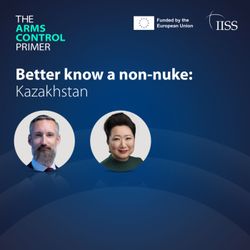
8. Better know a non-nuke: Kazakhstan
34:16||Season 5, Ep. 8In this week’s episode of The Arms Control Primer, Dr Alexander Bollfrass speaks with Dr Togzhan Kassenova about Kazakhstan’s legacy as the Soviet Union’s primary nuclear testing site, the human and environmental toll at Semipalatinsk, and the political decision to relinquish the world’s fourth-largest nuclear arsenal. They explore Kazakhstan’s path from inheriting over 1,000 warheads to joining the NPT, shaping the Budapest Memorandum, and championing the TPNW and what its experience means for today’s nuclear risk debates. 📩 Join the conversation—follow us on X (@IISS_org), LinkedIn or Instagram (iissorg) or visit the webpage of our Strategy, Technology and Arms Control research programme: Strategy, Technology and Arms Control | IISS Research programme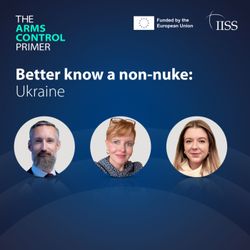
7. Better know a non-nuke: Ukraine
47:03||Season 5, Ep. 7In this episode of The Arms Control Primer, host Dr Alexander Bollfrass speaks with Dr Polina Sinovets and Darya Dolzikova about Ukraine’s nuclear history, from its role in the Soviet nuclear weapons programme to relinquishing nuclear arms in the 1990s, examining the Budapest Memorandum, nuclear coercion during Russia’s war against Ukraine, and the lessons this case holds for deterrence, non-proliferation, and security guarantees today.📩 Join the conversation—follow us on X (@IISS_org), LinkedIn or Instagram (iissorg) or visit the webpage of our Strategy, Technology and Arms Control research programme: Strategy, Technology and Arms Control | IISS Research programme
6. Better know a non-nuke: Libya
33:14||Season 5, Ep. 6In this episode of The Arms Control Primer, host Dr Alexander Bollfrass speaks with Dr Hassan Elbahtimy and Robert Kelley about Libya’s nuclear ambitions from 1969 to 2003, from foreign assistance and links to the A.Q. Khan network to the inspections that followed Muammar Gaddafi’s decision to abandon the programme and the lessons it holds for arms control and verification.📩 Join the conversation—follow us on X (@IISS_org), LinkedIn or Instagram (iissorg) or visit the webpage of our Strategy, Technology and Arms Control research programme: Strategy, Technology and Arms Control | IISS Research programme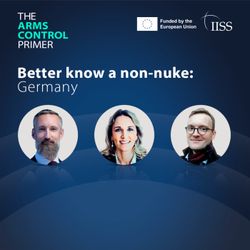
5. Better know a non-nuke: Germany
45:43||Season 5, Ep. 5In this episode of The Arms Control Primer, host Dr Alexander Bollfrass speaks with Prof Marina Henke and Dr Andreas Lutsch about Germany’s post-war nuclear trajectory, from early ambitions and NATO’s nuclear-sharing role to the NPT and renewed debates over deterrence amid Russia’s war in Ukraine.📩 Join the conversation—follow us on X (@IISS_org), LinkedIn or Instagram (iissorg) or visit the webpage of our Strategy, Technology and Arms Control research programme: Strategy, Technology and Arms Control | IISS Research programme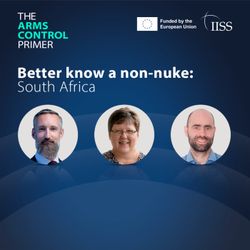
4. Better know a non-nuke: South Africa
35:45||Season 5, Ep. 4In this episode of The Arms Control Primer, host Dr Alexander Bollfrass is joined by Prof Anna-Mart van Wyk and Dr Robin E. Möser to explore how apartheid-era South Africa built a nuclear arsenal and how, after the end of apartheid, it became the first state to dismantle its weapons entirely. 📩 Join the conversation—follow us on X (@IISS_org), LinkedIn or Instagram (iissorg) or visit the webpage of our Strategy, Technology and Arms Control research programme: Strategy, Technology and Arms Control | IISS Research programme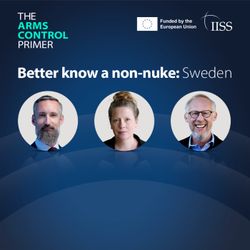
3. Better know a non-nuke: Sweden
36:44||Season 5, Ep. 3In this episode of The Arms Control Primer, host Dr Alexander Bollfrass is joined by Dr Emma Rosengren and Dr Thomas Jonter to examine Sweden’s nuclear ambitions during the Cold War, from its dual-use programme and domestic debate to its renunciation of the bomb and emergence as a leader in global disarmament.📩 Join the conversation—follow us on X (@IISS_org), LinkedIn or Instagram (iissorg) or visit the website of our Strategy, Technology and Arms Control research programme: Strategy, Technology and Arms Control | IISS Research programme
2. Better know a non-nuke: Iraq
39:14||Season 5, Ep. 2In this episode of The Arms Control Primer, host Alex Bollfrass is joined by Dr Hans Blix and Dr Stephen Herzog to examine Iraq’s nuclear ambitions under Saddam Hussein: from its early civilian programme to clandestine enrichment efforts and the post-Gulf War inspections that reshaped international safeguards and the future of arms control.📩 Join the conversation—follow us on X (@IISS_org), LinkedIn or Instagram (iissorg) or visit the website of our Strategy, Technology and Arms Control research programme: Strategy, Technology and Arms Control | IISS Research programme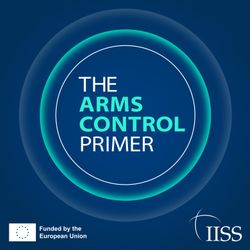
The Arms Control Primer | Season 5 | Trailer
00:43||Season 5The Arms Control Poseur is now the Arms Control Primer!🎙️ Hosted by Alex Bollfrass, Season 5 explores the nuclear past, present, and future by examining countries that once pursued or possessed nuclear weapons but ultimately gave them up.What lessons can their choices teach us about non-proliferation, arms control, and disarmament today?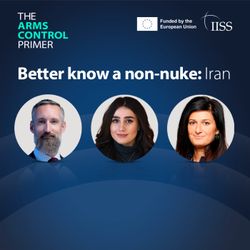
1. Better know a non-nuke: Iran
42:45||Season 5, Ep. 1In the season premiere of The Arms Control Primer, host Alex Bollfrass is joined by Dr. Nicole Grajewski and Dr. Azadeh Zamirirad to unpack Iran’s nuclear programme - from its origins under the Shah to the JCPOA, the 2025 Israel–Iran conflict, and the uncertain road ahead for diplomacy, deterrence and non-proliferation.📩 Join the conversation—follow us on X (@IISS_org), LinkedIn or Instagram (iissorg) or visit the website of our Strategy, Technology and Arms Control research programme: Strategy, Technology and Arms Control | IISS Research programme
loading...